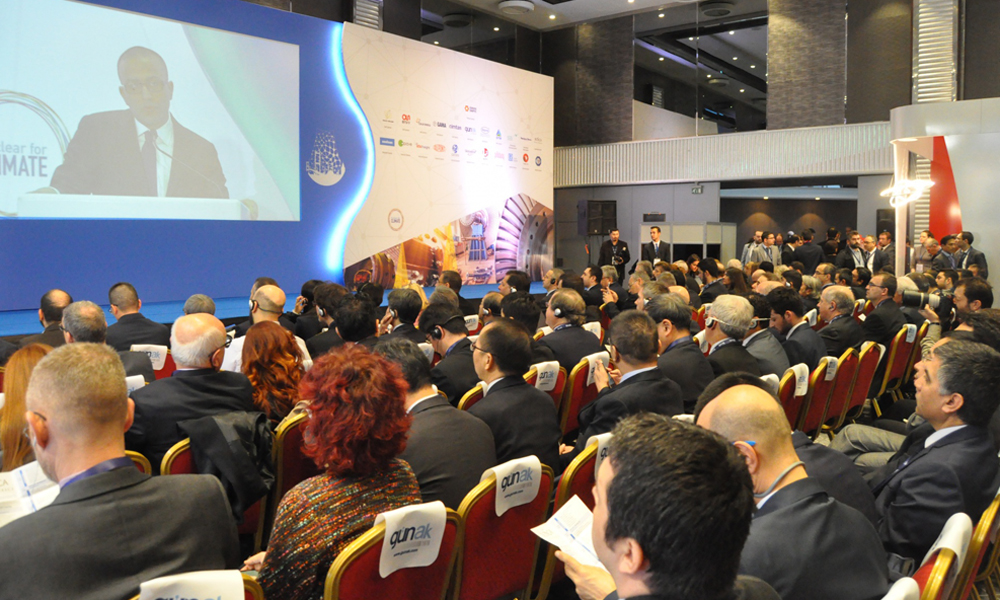
Nuclear Plant Creates Huge Market
back to contentsSpeaking at the summit opening, Head of the Organizing Committee Koray Tuncer noted that construction and operation of a nuclear plant is a very long story spanning decades. Every nuclear plant is a source of cheap electricity and a driver of adjacent industries. “By investing in nuclear and encouraging small and medium-sized businesses to manufacture relevant products, Turkey will get a chance to become a stakeholder in nuclear construction projects both in and outside its borders. This will transform Turkey from a technology importer into a technology vendor,” Koray Tuncer said.
According to Dr. Şule Ergün, Head of the Summit and an assistant professor at the Nuclear Engineering Department of Hacettepe University, construction of a single nuclear plant requires about 500,000 various machinery pieces and equipment components and creates 12,000 to 14,000 new jobs. “The impact of nuclear construction projects on economy can be compared to that of doping in sports. By 2060, about 30 nuclear stations will be put in operation in Turkey, Africa and the Middle East, with each project costing around 20 billion US dollars. Thus, we are talking about the creation of a huge market worth up to 600 billion US dollars,” Dr. Ergün said.
Akkuyu is a key project
One of the key sponsors of the summit was Akkuyu Nükleer, an owner of the Akkuyu nuclear plant construction project. Kürşad Tosun, Director for Licensing and Government Relations at Akkuyu Nükleer, commented on the process of Akkuyu licensing. He reminded that the site selection report was approved in February 2017 and the application for a construction license was submitted to the Turkish Atomic Energy Authority on 3 March 2017. Akkuyu Nükleer expects that the documents submitted will be sufficient to obtain a limited construction permit in 2017. Once the permit is issued, the company will be able to start building the non-nuclear structures of the plant, such as the turbine island, auxiliary buildings, etc. “Akkuyu Nükleer is approaching a very intense project stage. In February of this year, we applied for a power generation license to the Energy Market Regulatory Authority (EMRA), and it is now considering our application,” Mr. Tosun added.
Esra Songur, Trade and Local Procurement Coordinator at Akkuyu Nükleer, explained the mechanism of future procurements from local suppliers. According to Ms. Songur, criteria for selecting Turkish companies will include quality assurance level, quality certifications, experience, readiness to provide designing services, staff qualification, production capacity, etc.
Russian expertise
A centerpiece of the panel discussion was Russia’s expertise in nuclear power, particularly in staff training. Vladimir Artisyuk, Director for International Affairs at Rosatom’s Central Institute for Continuing Education and Training (CICET), noted that Russia had a long track record of foreign staff training. Vladimir Kondakov, Deputy Director of Russia’s National Nuclear Research University, said that the University was training over 700 foreign students from Turkey, Belarus, Jordan and other countries. Senior students from Turkey are already able to converse with teachers in fluent Russian.
Not long ago, the Ankara Chamber of Industry and Russia’s vocational educational institutions, including the Nuclear Construction Training Center (NCTC) and Rosatom’s Central Institute for Continuing Education and Training (CICET), signed a memorandum of understanding on workforce training for nuclear construction projects in Turkey. The memorandum provides for bilateral cooperation in such areas, as research, staff training for Turkey’s existing and yet-to-be-built nuclear power plants and research centers, qualified staff training for stakeholders in Turkey’s nuclear projects, development and implementation of modern approaches to nuclear knowledge management, etc.




